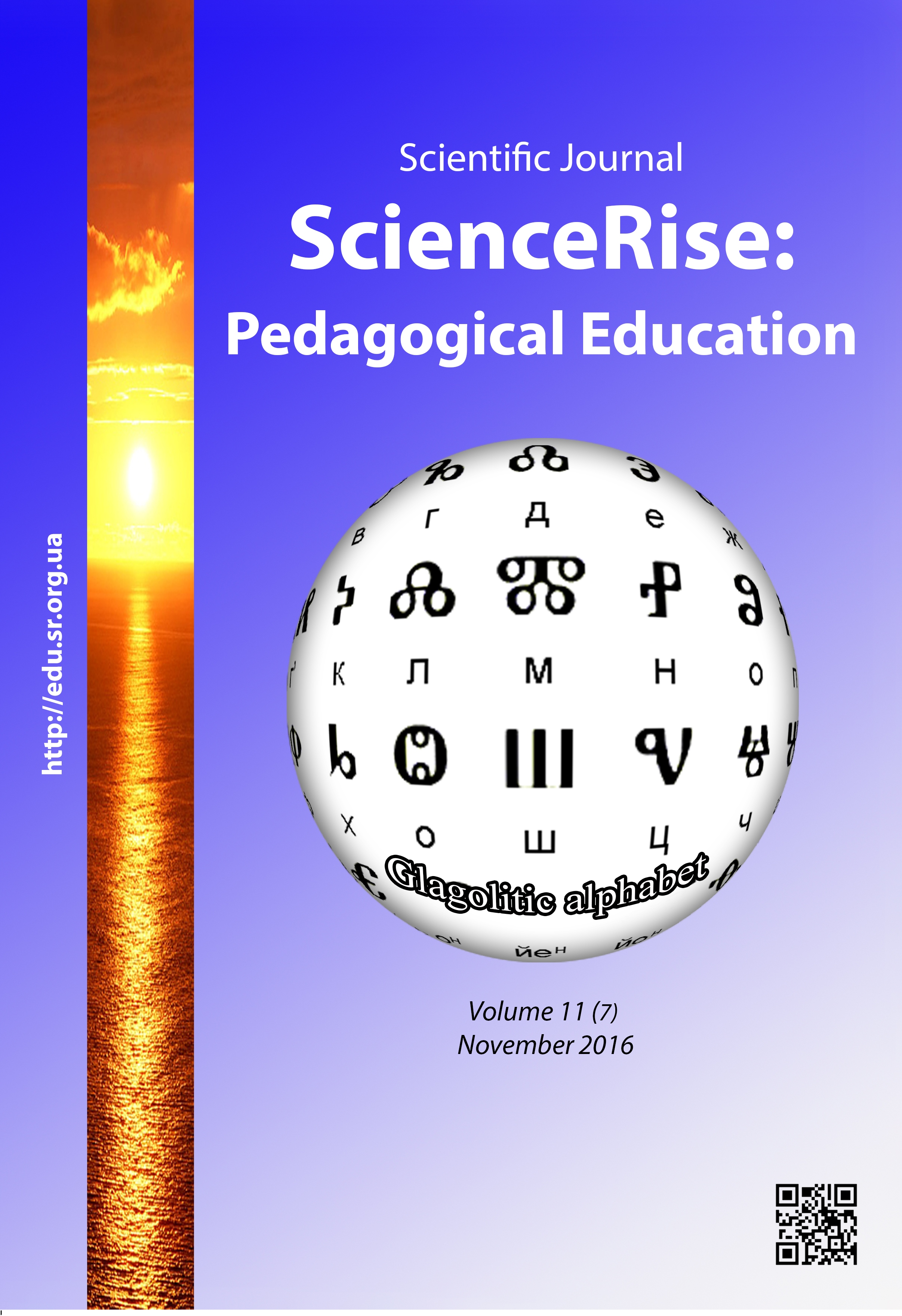The estimation of subjective factors of the influence on management of analytical and expert activity in the sphere of general secondary education of the region
DOI:
https://doi.org/10.15587/2519-4984.2016.84690Keywords:
analytical and expert activity, management of analytical and expert activity, subject, subjective factors, educational institutionAbstract
The integrated activities were analyzed in the aspect of control-estimating function. The necessity of management of these activities was ground. The notion of the management of analytical and expert activity was separated. The notion “subjective factor” was explained. The examples of the studies of influence of subjective factors on the different types of activities in the management of educational institution in the native and foreign experience were presented.
The following factors of influence on analytical and expert activity in the sphere of general secondary education in the region were studied: influence of the subjects of different level of educational management in the region on the management of analytical and expert activity, priorities of management in the aspect of educational departments and methodical services, level of confidence to the management of analytical and expert procedures that are carried out at the regional level by the subjects such as directors of school, their assistants and teachers. The result of research was the revelation of tendencies that brake the objectivity of analysis and expert examination of educational subjects and the outlining of the ways of improvement of effectiveness of the management of analytical and expert activity in the sphere of general secondary education of region. The perspectives of studies in this direction were determined, among them are: the search for other subjective factors, establishing of their causes and elaboration of arrangements for the development of analytical and expert competence of all subjects, involved into the management of general secondary education in the regionReferences
- Murashko, M. I. (2006). Menedzhment personalu: Navchal'no-praktychnyy posibnyk [Management of personnel]. Kyiv: Tovarystvo "Znannya", 311.
- Bodnar, O. S. Spetsyfika pidhotovky eksperta-analityka v osviti. Studia Zarządzańia i Finansów. Zarządzanie zasobami łudzkimi. Aspekty ekonomitszne i sotsjologitszne. Poznań: Poznań, 8, 115–123.
- Bodnar, O. S. (2015). Evaluation of management efficiency of analytical and expert activity in the field of general secondary education of region. ScienceRise, 4 (1 (9)), 61–65. doi: 10.15587/2313-8416.2015.40114
- Bodnar, O. S. (2013). Upravlinnya analityko-ekspertnoyu diyal'nistyu u sferi zahal'noyi seredn'oyi osvity rehionu (teoretyko-prykladnyy aspekt) [Management analytical and expert activity in the field of universal middle education of region (theoretical and applied aspect)]. Кrok, 544.
- Yvanov, D. A. (2008). Ekspertiza v obrazovanii : ucheb. posobiedlyastud. vysshihucheb. zavedenij [Examination is in education]. Moscow: Akademiya, 336.
- Kun'ch, Z. Y. (2005). Universal'nyy slovnyk ukrayins'koyi movy. Ternopil': Bohdan, 848.
- Novikov, A. M. (2013). Metodologiya: slovar' sistemy osnovnyh ponyatij. Moscow: Librokom, 208.
- Shemchuchenka, Yu. S., Babkina, V. D., Horbatenka, V. P. (Eds.) (2004). Politolohichnyy entsyklopedychnyy slovnyk. Kyiv: Heneza, 736.
- Korzhenko, V. V., Korobko, I. V. (2009). Derzhavne upravlinnya yak sub"yektyvnyy faktor suspil'noho rozvytku. Teoriya ta praktyka derzhavnoho upravlinnya, 1 (24), 1–7.
- Pysarenko, Zh. A. (2008). Faktory vplyvu na kul'turu derzhavnoho upravlinnya. Derzhavne budivnytstvo, 1. Available at: http://nbuv.gov.ua/UJRN/DeBu_2008_1_18
- . Yel'nykova, H. V. (2015). Adaptyvne upravlinnya: prykladnyy aspekt, poshyrennya v osvitniy systemi Ukrayiny [Adaptive control: the applied aspect, distribution in the educational system of Ukraine]. Ternopil': Krok, 420.
- Bondar, V. I. (2000). Teoriya i tekhnolohiya upravlinnya protsesom navchannya v shkoli [A theory and technology of process control of studies are at school]. Kyiv: FADA, LTD, 191.
- Konarzhevskyy, Yu. A. (1986) Pedahohycheskyy analyz uchebno-vospytatel'noho protsessa I yupravlenyya shkoloyu [Pedagogical analysis of teaching and educational process and management of school]. Moscow: Pedagogicа, 144.
- Kryzhko, V. (2005). Antolohiy aaksiolohichnoyi paradyhmy upravlinnya osvitoyu. [Anthology of paradigm of axiology of management education]. Kyiv: Osvita Ukrayiny, 440.
- Novikov, D. A. (2001). Management of active system: stabylite and efficiency. System science, 26 (2), 85–93.
- Bartkowiak, G.; Czerwiński, K., Knocińska, A., Okrasa, M. (Eds.) (2012). Czynniki warunkujące skuteczność przekazu perswazyjnego menedżera w zróżnicowanym kulturowo srodowisku pracy. Redacja naukowa:. Torun: Adam Marszałek, 227.
- Narvana, R., Korzeniewska, E., Tanajewska, A., Szczepańska, K. (2013). Dokumentacja dyrektoraszkoły. Gdansk: HARMONIA, 264.
- Stronge, J. H. (1995). Balancing individual and institutional goals in educational personnel evaluation: A conceptual framework. Studies in Educational Evaluation, 21 (2), 131–151. doi: 10.1016/0191-491x(95)00010-r
- Kordziński, J. (2012) Zarządranie rozmojem szkoły. Warszawa: ABCa Wolters Kluwerbusiness, 129.
- Cable, D. M., Judge, T. A. (2003). Manager’ upward influence tactic strategies. The role of personality and supervisor leadership style. Journal of Organizational Behaviou, 24 (2), 197–214. doi: 10.1002/job.183
- Sidorenko, E. V. (2003). Metody matematicheskoj obrabotki v psihologiy. [Methods of mathematical processing in psychologists]. SPb.: OOO «Rech'», 350.
Downloads
Published
How to Cite
Issue
Section
License
Copyright (c) 2016 Оксана Степанівна Боднар

This work is licensed under a Creative Commons Attribution 4.0 International License.
Our journal abides by the Creative Commons CC BY copyright rights and permissions for open access journals.
Authors, who are published in this journal, agree to the following conditions:
1. The authors reserve the right to authorship of the work and pass the first publication right of this work to the journal under the terms of a Creative Commons CC BY, which allows others to freely distribute the published research with the obligatory reference to the authors of the original work and the first publication of the work in this journal.
2. The authors have the right to conclude separate supplement agreements that relate to non-exclusive work distribution in the form in which it has been published by the journal (for example, to upload the work to the online storage of the journal or publish it as part of a monograph), provided that the reference to the first publication of the work in this journal is included.







